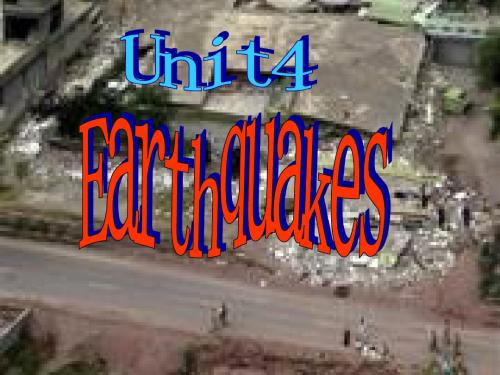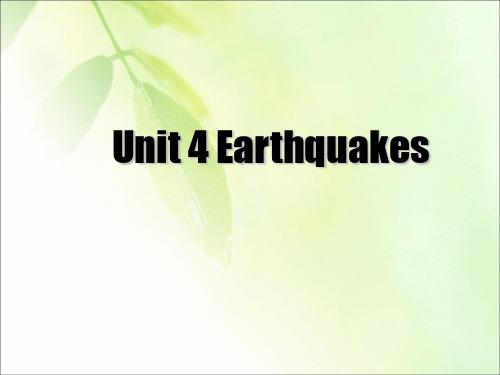人教版高中英语必修1 Unit4 Earthquakes warming up 课件 (共24张PP
- 格式:ppt
- 大小:2.32 MB
- 文档页数:24


人教版_高中英语1 _必修_ Unit 4 Earthquakes 教学设计——Period 1 Warming up and Reading【Teaching Material】This unit is about natural disasters through the world and china, as we know, has a particular problem with earthquakes. In the last century five of the ten worst earthquakes happened in China. Although it is important for students to understand the dangers people face in a quake, it is just as important for them to realize that there are things that can be done to minimize the damage caused by quakes. For this reason, this unit keeps a positive tone or outlook. It includes exercises and tasks that enables students to think about how to avoid quakes, or at least some of the damage they can cause. This unit also lets them role-play community work that deals with disaster relief. As we all know, reading belongs to the input during the process of the language learning. The input has great effect on output, such as speaking and writing.【Teaching goals】Knowledge aims:1. Get the students to learn the following useful new words and expressions in this passage.2. Know basic knowledge about earthquakes.Ability aims:Develop the students’ ability and let them learn different reading skills.Get the students collect the information from the internet by themselves.Emotional aims:Get the students to be aware of the terrible disasters, meanwhile get them to face it, treat it in a proper way, and never get discouraged.【Teaching important points】1. Get the students to learn about Tangshan Earthquake.2. Get the students to learn different reading skills.【Teaching difficult points】Develop the students’ reading ability.【Teaching methods】1. Task-based teaching and learning.2. Fast reading, intensive reading3. Discussion.【Teaching aids:】CAI课件, A tape recorder【Teaching procedures】Step 1 Warming upWarming up by lookingShow Ss some pictures about natural disasters and ask them two questions.1. Can you tell some natural disasters?(volcano, fire, sandstorm, typhoon, hailstone, thunderstorm, flood, hurricane, earthquake)2. Have you ever experienced an earthquake? Can you describe how terrible an earthquake is?(The earth is shaking; all the buildings will fall down; many people will die; many children will become orphans.)Warming up by discussingNow, look at the pictures of Tangshan and San Francisco in warming up and describe what you see in the pictures.(Beautiful cities; broad roads; tall building; large population...)What will happen if there has been a big earthquake in these two cities?As we all know, earthquakes are disasters to everyone. But can we avoid or at least reduce the loss caused by earthquakes? Can we foretell earthquakes? Now let’s come to Pre-reading and decide what may happen before an earthquake comes.Step 2 Pre-readingImaging and sharingImagine there is an earthquake now. Your home begins to shake and you must leave it right away. You have time to take only one thing. What will you take? Is it money, water, fruits, mobile, phones, a torch light, or anything else? Why?Talking and sharingWhat are the signs of an earthquake? Talk about the pictures on Page 25.(e.g. Cows, pigs and dogs become too nervous too eat. The mice will run out of the fields looking for places to hide. The water in the wells will rise and fall. Walls of the wells in village will have deep cracks. There will be bright light in the sky….) Step 3 ReadingTell the students: Today, we are going to read a news report about the strongest earth-quake in China’s history, which happened in Tangshan, Hebei, in 1976.1. Fast readingAsk the students to read the passage quickly.1) Answer some questions.Ask the students to read the passage quickly and pay attention to the first sentence of each paragraph.2) Find out the topic sentences of each paragraph and get the general idea of the passage.3) Do some true or false exercises.Ask the students to decide whether the following statements are true or false. If it is false, try to correct it.2. Reading carefullyAsk the students to read the passage carefully to lacate particular information.1) Do the exercises in the part Comprehending on Page 27.2) Do some multiple choices.3. Language problemsWhile checking the answers with the whole class,deal with any language problems that the students can’t understand.4. Reading aloudPlay the tape of the passage for the students to listen and follow. Then play the tape of Paragraph 1 of the passage once more; this time the students listen and repeat.Step 4 GameWork in pairs. Supose you are a newspaper reporter, and other is a witness of the 1976 Tangshan Earthquake. Now the newspaper reporter is interviewing the witness.Step 5 DiscussionHow can we protect ourselves in the earthquake?Earthquake Survival TipsDriving --- pull over and stay in your car.In a building--- get near a strong wall / The corner of the room is the safest.Having classes--- listen to the teacher’s instruction, protect their heads and hide under the desks.On buses--- Grasp the handles to avoid being injured; lower the center of gravity; hide near the seats; get off after the earthquake passed.Step 6 HomeworkP review the reading “A Night the Earth didn’t Sleep” and learn new words of this unit.。



